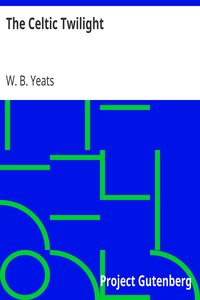| Author |
Yeats, W. B. (William Butler), 1865-1939 |
| Title |
The Celtic Twilight
|
| Note |
Reading ease score: 80.5 (6th grade). Easy to read.
|
| Contents |
This book -- A teller of tales -- Belief and unbelief -- Mortal help -- A visionary -- Village ghosts -- 'Dust hath closed Helen's eye' -- A knight of the sheep -- An enduring heart -- The sorcerers -- The devil -- Happy and unhappy theologians -- The last gleeman -- Regina, regina pigmeorum, veni -- 'And fair, fierce women' -- Enchanted woods -- Miraculous creatures -- Aristotle of the books -- The swine of the gods -- A voice -- Kidnappers -- The untiring ones -- Earth, fire and water -- The old town -- The man and his boots -- A coward -- The three O'Byrnes and the evil faeries -- Drumcliff and Rosses -- The thick skull of the fortunate -- The religion of a sailor -- Concerning the nearness together of heaven, earth, and purgatory -- The eaters of precious stones -- Our Lady of the hills -- The golden age -- A remonstrance with Scotsmen for having soured the disposition of their ghosts and faeries -- War -- The queen and the fool -- The friends of the people of faery -- Dreams that have no moral -- By the roadside -- Into the twilight.
|
| Credits |
Produced by Carrie Lorenz. Special thanks to John B. Hare, redactor for this text and significant contributor to its preparation for PG
|
| Summary |
"The Celtic Twilight" by W. B. Yeats is a collection of folklore and mystical tales written during the late 19th century. The work captures the essence of Irish culture, focusing on the supernatural aspects of life in Ireland, including faeries, spirits, and the rich tapestry of Irish mythology. Yeats draws from personal experiences and stories he has encountered, intertwining them with his contemplations of art, belief, and the nature of reality. At the start of the book, Yeats expresses his desire to create a small world populated by beautiful and significant elements of Irish culture as he describes his efforts to document the stories he has heard and observed. He introduces Paddy Flynn, a charismatic and eccentric old storyteller embodying the connection between the mundane and the mystical. Flynn shares tales of faerie encounters and peculiar happenings, emphasizing the pervasive belief in the supernatural within Irish folklore. Yeats also reflects on themes of belief and unreason, presenting a narrative texture that is at once autobiographical and steeped in the enchanting landscapes of Celtic legends, laying the groundwork for a richly imaginative exploration of Ireland’s cultural heritage. (This is an automatically generated summary.)
|
| Language |
English |
| LoC Class |
PR: Language and Literatures: English literature
|
| Subject |
Yeats, W. B. (William Butler), 1865-1939 -- Homes and haunts -- Ireland -- Sligo (County)
|
| Subject |
Yeats, W. B. (William Butler), 1865-1939 -- Childhood and youth
|
| Subject |
Tales -- Ireland -- Sligo (County)
|
| Subject |
Poets, Irish -- Homes and haunts -- Ireland -- Sligo (County)
|
| Subject |
Mythology, Celtic -- Ireland -- Sligo (County)
|
| Subject |
Poets, Irish -- 19th century -- Biography
|
| Subject |
Folklore -- Ireland -- Sligo (County)
|
| Subject |
Sligo (Ireland : County) -- Social life and customs
|
| Category |
Text |
| EBook-No. |
10459 |
| Release Date |
Dec 1, 2003 |
| Most Recently Updated |
Dec 6, 2024 |
| Copyright Status |
Public domain in the USA. |
| Downloads |
402 downloads in the last 30 days. |
|
Project Gutenberg eBooks are always free!
|

